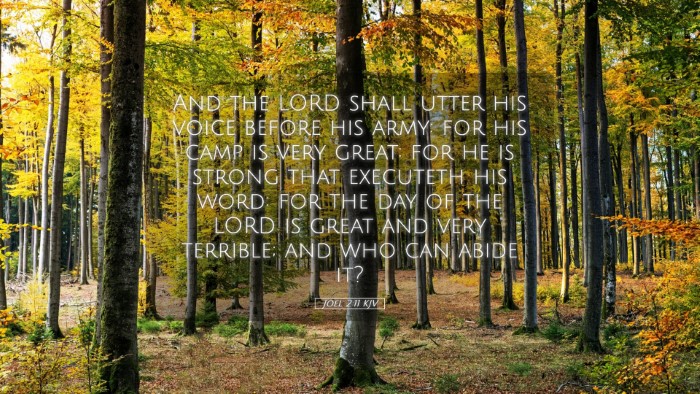Commentary on Joel 2:11
Joel 2:11 states: "And the LORD shall utter his voice before his army: for his camp is very great: for he is strong that executeth his word: for the day of the LORD is great and very terrible; and who can abide it?"
Introduction
This verse encapsulates the theme of divine authority and judgment inherent in the prophetic messages of Joel. It speaks to both the might of God's army and the severity of the day of the LORD, urging readers to consider their response to God's call. The imagery presented serves as a sobering reminder of the power of God and the seriousness of His coming judgment.
Divine Authority
As Matthew Henry observes, "The Lord shall utter His voice before His army." This phrase indicates not merely a command but the authoritative voice that governs the Israelite army, illustrating God's sovereign control over all creation and the events of history. God’s voice generates response and action, signifying that He is ever in command of His creation.
Albert Barnes further elaborates that the reference to an "army" in this context is not only about the literal military force but also speaks to the heavenly hosts, hinting at angels who execute God's will. The force behind this army is God Himself, revealing an aspect of His omnipotence and the seriousness with which He directs the affairs of humanity.
The Greatness of God's Army
In continuing with the verse, when it states, "for his camp is very great," Adam Clarke remarks on the size and strength of God’s camp, implying the vastness of God’s dominion. This could also be interpreted as a reflection of the divine assembly that accompanies God's judgment: innumerable and mighty, emphasizing that the Lord has the forces of heaven at His disposal.
Henry further comments on the reliability of God, highlighting that "he is strong that executeth his word," suggesting that not only is God powerful, but there is also a faithfulness in His promises and proclamations. His commands are executed with precision and reliability, showcasing His unmatched sovereignty.
The Day of the LORD
The phrase "the day of the LORD is great and very terrible" serves as a central point of debate and reflection among scholars. Joel positions this day as one of catastrophic significance, indicative of God's impending judgment on not just Israel but on all nations. Barnes points out that the term "terrible" signals the profound fear and reverence that should accompany the recognition of God’s authority to judge.
Additionally, Clarke emphasizes the duality of this day; while it signifies judgment, it simultaneously opens a door to repentance. It is a call for people to consider their lives in light of God's rigorous standards. The impending judgment is intended not to crush spirits but to awaken the hearts of individuals to the reality of God's holiness.
Who Can Abide It?
The closing question, "and who can abide it?" speaks to the weight of accountability each individual carries before God. Henry interprets this inquiry as a call to humility, reminding us that no one is exempt from divine scrutiny. This rhetorical question leaves readers with a profound sense of urgency to reflect on their own state before God.
Barnes stresses the importance of this reflection, indicating that aware of God’s power, one should approach Him with reverence, recognizing human frailty. Thus, the emphasis is on the need for repentance and dependence on God's grace, aligning with Joel's overarching message of coming back to God amidst impending judgment.
Conclusion
In summary, Joel 2:11 serves as a powerful reminder of God's absolute sovereignty over His creation and the serious implications of His judgment. For pastors, students, and theologians, it offers an opportunity to explore themes of divine authority, accountability, and the need for repentance. The rich insights from Matthew Henry, Albert Barnes, and Adam Clarke remind us of the importance of recognizing the greatness of God’s army and the gravity of the day of the LORD, encouraging an earnest pursuit of holiness in our lives.


